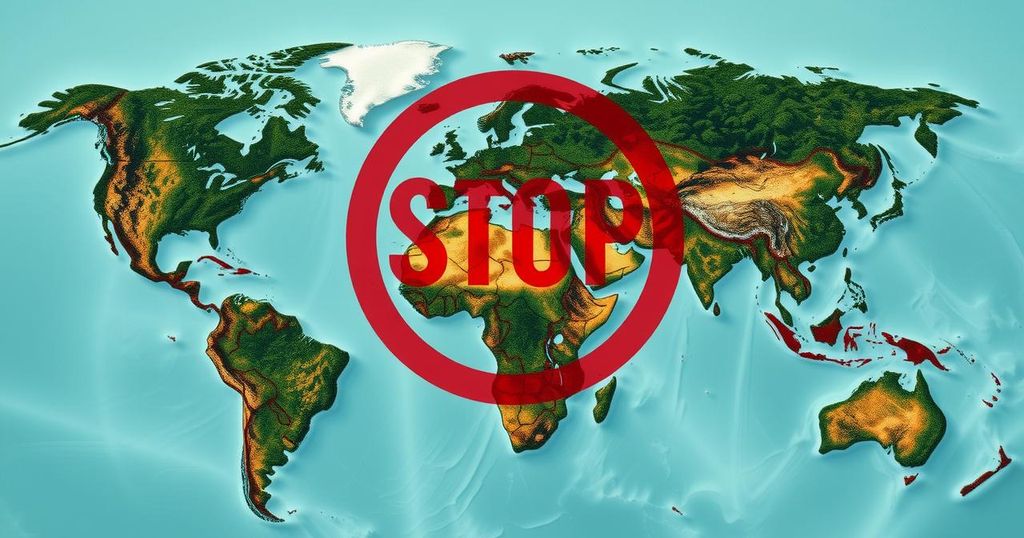Urgent Action Required to Combat Global Deforestation Amid Worsening Trends
The world is significantly behind in halting deforestation, with 6.37 million hectares lost in 2023 as reported in the “2024 Forest Declaration Assessment.” The report underscores the urgent need for global action in forest conservation and restoration, highlighting the continued pressures posed by climate change and unsustainable practices. The importance of Indigenous community involvement and the necessity for enhanced climate targets in Europe are also discussed.
The global community is significantly behind in its promise to combat deforestation and forest degradation, with a staggering 6.37 million hectares of forest lost in 2023 alone, according to the “2024 Forest Declaration Assessment: Forests under fire” report. The document emphasizes the urgency for immediate actions to preserve forests, as they play a crucial role in addressing climate change and biodiversity loss. It notes that, despite attempts at restoration, original ecosystems cannot be replaced, indicating that preventative measures are essential. Key areas of concern include increased tropical deforestation, loss of primary forests, worsening forest fires, and the detrimental conversion of various natural ecosystems.
Efforts for restoration are hindered by insufficient data and poor monitoring, particularly in biodiversity-critical regions. To effectively meet global environmental objectives, the report calls for stronger efforts in forest conservation, reduction of overconsumption, and implementation of extensive restoration initiatives. Governments are urged to adopt a human-rights perspective in their approach, enforce regulations regarding protected areas, and address man-made fire patterns. Furthermore, the report stresses the need for the protection of Key Biodiversity Areas as a means to maintain the myriad ecosystem services forests provide.
Forest researcher Robert Nasi highlights that 2024 will be a complex year for global forests, as advancements in technology and international collaboration offer hope amid ongoing threats. Positive developments, such as significant reductions in deforestation in Brazil and Indonesia through stricter regulations and sustainable practices, present encouraging signs. Technological advancements, including satellite imagery, have substantially improved monitoring capabilities and detection of illegal activities. Indigenous communities, recognized for their sustainable management practices, play a vital role in conservation, particularly in deforested regions like the Amazon.
However, the pressures of climate change remain a formidable challenge, contributing to rising temperatures, altered precipitation patterns, and an increase in wildfires. While deforestation has diminished in the Amazon, illegal logging and unsustainable resource practices exacerbate tree loss in other tropical regions, revealing the need for a multifaceted approach that emphasizes international collaboration, robust governance, sustainable agricultural practices, and empowering Indigenous communities.
In Europe, the European Union’s ambitious climate targets aimed at mitigating climate change and halting deforestation face considerable threats due to extreme weather, wildfires, and unsustainable forestry methods. The European Commission’s proposed target of a 90% net reduction in greenhouse gas emissions by 2040 has drawn criticism for lacking the urgency warranted by the current climate crisis. The World Wildlife Fund advocates raising the 2030 target to at least a 65% reduction and emphasizes the need to phase out fossil fuels by 2030 while fully transitioning to renewable energy by 2040. A just transition that supports vulnerable communities is essential, along with increased climate finance for developing countries to meet the EU’s global climate obligations.
It is critical that all entities recognize the implications of continued deforestation and prioritize necessary actions to facilitate forest preservation and restoration.
Ultimately, concerted efforts from governments and organizations are paramount in addressing the multifaceted challenges posed by deforestation and forest degradation. The implementation of comprehensive strategies, stakeholder cooperation, and recognition of Indigenous rights will enhance the sustainability of forests, fostering a resilient ecosystem capable of supporting biodiversity and mitigating climate change.
Deforestation remains a pressing global issue despite international pledges aimed at its cessation by 2030. The unsustainable loss of forests not only aggravates climate change but also poses substantial risks to biodiversity. Recent evaluations, such as the “2024 Forest Declaration Assessment,” underline the critical need for urgent government action to address forest degradation. With deforestation rates rising, particularly in biodiversity-rich areas, and restoration efforts failing to match the complexity of ecosystems lost, it is evident that a multifaceted response incorporating conservation, sustainable management, and respect for human rights is crucial.
In conclusion, urgent action is imperative to halt the accelerating rates of deforestation globally. This requires a multifaceted approach that encompasses improved data collection, stronger governance, and recognition of Indigenous rights. Countries must enhance their climate targets and invest in restoration initiatives while prioritizing environmental justice. The global community’s ability to effectively address deforestation will significantly influence the health of the planet and its ecosystems moving forward.
Original Source: www.euractiv.com




Post Comment